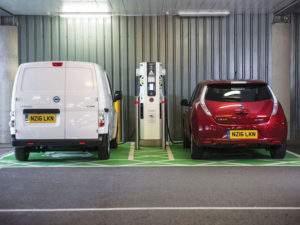Shell Future of fleet survey – the results
In the first in a series of exclusive surveys, Shell and International Fleet World questioned 231 fleet executives about their attitudes to a host of fleet industry topics including alternative fuels, future mobility and the ever-changing role of the fleet manager.
Respondents had varying fleet sizes, with the majority running more than 200 vehicles in their fleet (37%) and the next largest group being those that operate smaller fleets of up to 25 vehicles (26%).

37% of respondents planned to upgrade fleet management technologies as a priority.
Fleet Management
Despite the fuel and cost saving benefits dedicated fleet management systems offer, over half of fleet executives (51%) still only use office-based and manual systems for their everyday fleet management tasks, such as job allocation, vehicle maintenance and driver management.
This is potentially due to a lack of understanding around fleet management technologies. Two out of every five fleet managers are still unclear on the value new fleet management technologies could offer their company, and almost a quarter of fleet managers are unclear on what suitable options exist.
Yet the benefits fleet management systems can provide for their companies are not unrecognised by all. When asked what would be their main investment to give their business a competitive advantage, 37% said upgrading fleet management technologies, while 50% expect their roles to include a greater reliance on these technologies in the next five years.
However, cost (63%) the perceived complexity of integrating these new technologies (50%) and driver reluctance (43%) are potential barriers to their adoption that the industry needs to address.
Fleet managers are aware that their roles are expanding and becoming increasingly more complex. No longer is the focus only on managing the company’s fleet of vehicles and their drivers. They expect to see cost control (66%), pressure to comply with environmental legislation (60%) and managing their drivers’ wellbeing playing a greater part in their role in the coming years.

One in five fleet managers intended to incorporate more EVs in the next year.
Future challenges
The fleet industry, and the role of the fleet manager, are expected to undergo a fundamental shift, with three in four fleet managers anticipating significant changes within the next five years.
These will present a need to adapt to an increasing number of vehicles running on alternative fuels (76%) as engines and fuel technologies continue to advance. Currently, internal combustion engines dominate passenger car fleets, even in the most advanced vehicle markets.
However, a rise is being seen in the number of hybrid and electric fleets and these are only expected to increase. One in five of fleet managers are intending to incorporate more electric vehicles into their fleet in the next year, while 40% plan to incorporate them within the next five years. There are a variety of fuel and vehicle options for fleets, including hydrogen, electric, biofuels and natural gas. With a mosaic of fuel and vehicle options available, managers can look to evolve their fleet to suit changing urban environments, while also improving fuel efficiency, managing emissions and lowering total cost of ownership.
But before this can be achieved, there are some hurdles to overcome – over half of fleet managers feel that they are currently ill equipped to convert their fleet to electric vehicles, and only 7% felt that their company would be very well equipped to convert half of their fleet to electric vehicles within the next year.
Unsurprisingly, given the early stages of its development, the rise of autonomous vehicles appears to be less worrying, with just 10% of fleet professionals expecting it to affect the biggest change in the industry in the next five years.
The commercial road transport sector is likely to face a shake-up from many rapidly developing vehicle technologies (77%). Although their roles are evolving, the problems fleet managers would like these to solve remain consistent, with them looking to drive down costs, (53%) and improve fuel efficiency (68%) and driver safety (50%).
As regulations around fuel emissions and efficiency tighten, fleet managers’ appetites for technologies that will help make their fleets greener are growing. While government legislation (46%) is expected to greatly influence the future of the fleet industry, just under half cited it as an issue they would like innovative technologies to help them overcome.
City infrastructure (51%) and consumer demands (46%) are expected to shape how these changes is addressed. Achieving greater adoption of alternative fuels and new technologies will require collaborative action from vehicle manufacturers, fuel providers and infrastructure providers alike.
In preparation for the changes ahead, fleet managers plan to invest in new vehicles (27%) and technologies (26%), as well as participate in training to upskill their fleet management knowledge (24%).
As new technologies, evolving legislation and changing consumer demands shape the fleet industry, fleet managers’ roles are becoming more strategic and gradually evolving into ‘Mobility Managers’ making them responsible for handling all travel and transport arrangements.
Ensuring the sustainability of a new model of mobility will require effective planning to manage how fleets travel around cities, increased focus on maximising the efficiency of diesel fuelled heavy-duty vehicles, and wider adoption of alternative fuel vehicles.
Respondents will receive a £5 Shell fuel voucher, and will be entered into a prize draw to win an iPad Mini.

Published in association with euroShell Card and International Fleet World.

